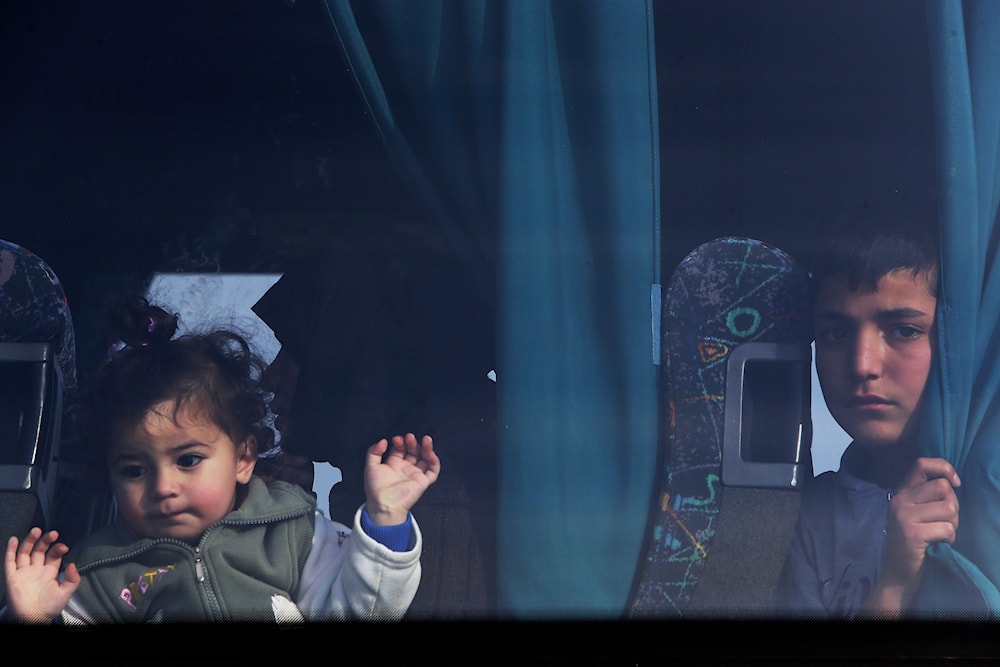Cyprus urges EU to contain excessive Syrian migrant flow from Lebanon
The Cypriot President is due to hold talks with EU President Ursula von der Leyen in Athens on Sunday, before flying to Beirut on Monday with his interior and foreign ministers.
-

Young migrants from Syria sit in a bus as they arrive at a refugee camp at Kokkinotrimithia outside of the capital Nicosia, Cyprus, on Saturday, February 4, 2017. (AP)
A day before traveling to Beirut for discussions on Monday, Cyprus’s Interior Minister Constantinos Ioannou urged Brussels to tackle the migrant crisis on the island, saying its reception facilities were on the edge of breaking.
“This is a cry for help,” Ioannou told The Guardian, adding, “There has been a very sharp increase [in flows]. We are in crisis mode, reaching our limits.”
Just last week, 800 people traveled on 15 boats for 10 hours from Lebanon to Cyprus, putting the island in what its president, Nikos Christodoulides, called “a state of serious crisis”.
Ioannou said, “Most of those 800 were young males... But they also included nearly 100 unaccompanied children for whom we had to immediately provide guardianship. We strongly believe [Lebanon] should be financially assisted by the EU.”
He reiterated that an aid package like the €7.4 billion ($8 billion) one between the EU and Egypt last month should be discussed for Lebanon as well, as the matter was “gaining traction” within the EU.
Ioannou stressed that “Lebanon has 2 million Syrian refugees,” and that it doesn't "have the capacity to manage their borders which is why they need help.”
Christodoulides is due to hold talks with EU President Ursula von der Leyen in Athens on Sunday before flying to Beirut on Monday with his interior and foreign ministers.
Read next: West does not want refugees back in Syria: Lebanese FM to Al Mayadeen
From an influx to a flood
Figures released by the Cypriot Interior Ministry show that over 2,000 people traveled the 100-mile sea crossing from Syria in the first three months of this year, compared with 78 in the same period last year.
With that being said, Christodoulides warned that measures that “are not liked” would be enforced if the influx continues to increase.
Hubert Faustmann, professor of history and political science at the University of Nicosia, said: “If you draw a circle around Cyprus you see countries, with the exception of Greece, convulsed by violence, instability and war,” noting: “The government is very fearful that this influx could turn into a flood given the experience of the past.”
He analyzed that “If the war escalates into Lebanon it will automatically trigger ever bigger refugee flows... It is easy to see how, as an EU Mediterranean border state, Cyprus would push for an agreement with Lebanon much as Greece did with Egypt.”
The Cypriot Interior Minister said that even though EU funds are aiding in the expansion of its capacity to host refugees, Brussels should also consider declaring parts of Syria safe for repatriation.
He relayed Cyprus' belief that "13 years after the [eruption of the] conflict we should re-evaluate Syria, look at safe zones there and legal pathways to relocate citizens to those areas".
“Refugees, generally, are totally misinformed by smuggler networks about Cyprus. They have no idea Cyprus is out of Schengen [the European area in which border controls are abolished] and think that, once here, they can get a train to Berlin.”

 3 Min Read
3 Min Read








